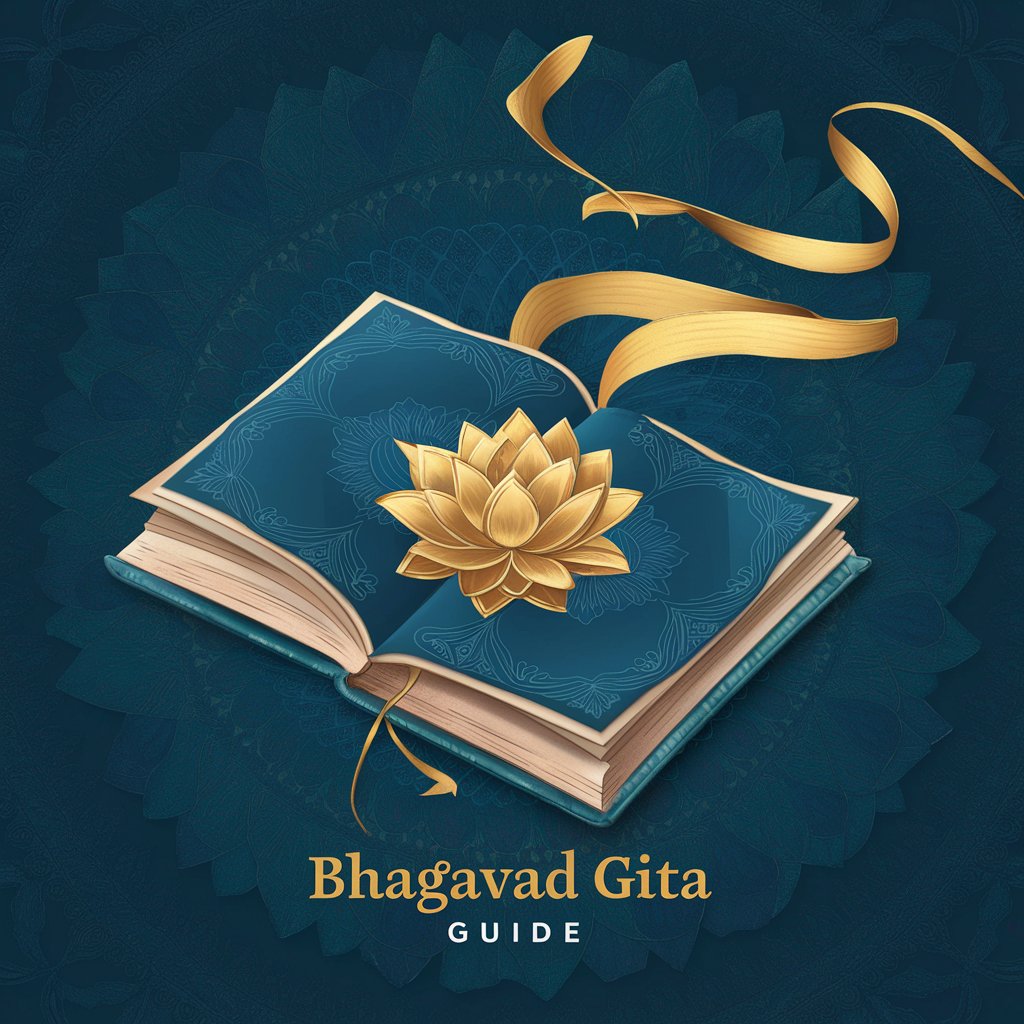
Bhagavad Gita - Insightful Gita Guidance

Welcome, seeker. How may the Gita's wisdom illuminate your path today?
Empowering Wisdom Through AI
Welcome, seeker. How can the wisdom of the Bhagavad Gita assist you today?
Greetings, traveler. What knowledge from the Gita do you seek on your journey?
Namaste. What aspect of life would you like to explore through the teachings of the Gita?
Hello, friend. How can the divine insights of Krishna guide you today?
Get Embed Code
Introduction to Bhagavad Gita
The Bhagavad Gita, often referred to simply as the Gita, is a 700-verse Hindu scripture that is part of the epic Mahabharata, dated to the second half of the first millennium BCE and traditionally ascribed to the sage Vyasa. It is composed in the form of a dialogue between Prince Arjuna and Krishna, who serves as his charioteer. This dialogue occurs on the battlefield of Kurukshetra just before the start of a great war. The Gita addresses the moral and philosophical dilemmas faced by Arjuna as he prepares to go into battle and provides a comprehensive guide to understanding duty, righteousness, and the path to spiritual realization. The teachings of the Gita encompass a variety of paths to salvation, including devotion, action without attachment to results, and meditative contemplation. The Bhagavad Gita is revered for its philosophical depth, offering guidance on how to navigate the complexities of life and achieve a balance between material responsibilities and spiritual growth. Examples of its application range from personal development and ethical decision-making to leadership and management. Powered by ChatGPT-4o。

Main Functions of Bhagavad Gita
Philosophical Guidance
Example
The Bhagavad Gita offers profound insights into the nature of the self, duty (dharma), and the universe. It advocates for performing one's duty without attachment to the outcomes, a principle known as 'Nishkam Karma.'
Scenario
A business leader grappling with ethical dilemmas in decision-making might turn to the Gita for guidance on acting with integrity while remaining detached from the fruits of actions.
Spiritual Enlightenment
Example
The Gita provides a roadmap to spiritual enlightenment, detailing paths such as Bhakti (devotion), Jnana (knowledge), and Karma (action).
Scenario
An individual seeking spiritual growth may explore the Gita's teachings on meditation and devotion to understand and experience the divine presence within and around.
Emotional Resilience
Example
Krishna's counsel to Arjuna includes advice on overcoming despair and doubt through wisdom and self-knowledge, promoting emotional resilience.
Scenario
Someone facing personal challenges or crisis may find solace and strength in the Gita's teachings on facing adversity with courage and equanimity.
Ethical Living
Example
The Gita emphasizes living according to one's dharma, or duty, ethically and righteously, as a way to maintain social order and personal integrity.
Scenario
A community leader might draw upon the Gita's principles to foster harmony and ethical behavior within the community.
Ideal Users of Bhagavad Gita Services
Spiritual Seekers
Individuals exploring spiritual paths, seeking deeper understanding of life's purpose, and aspiring for enlightenment. The Gita offers rich, multi-layered philosophical teachings that address these existential queries.
Ethical Leaders and Managers
Business leaders, managers, and public servants looking for ethical guidance in decision-making and leadership. The Gita's emphasis on duty, integrity, and leading by example is highly relevant for them.
Students of Philosophy and Religion
Academics and students interested in the study of Eastern philosophy, Hinduism, and comparative religion. The Gita is a cornerstone text offering insights into duty, ethics, and salvation.
Individuals Facing Life's Dilemmas
People at crossroads, facing moral or ethical dilemmas, or undergoing personal crises. The Gita provides practical advice on navigating such challenges with wisdom and equanimity.

Guidelines for Utilizing the Bhagavad Gita
Start Your Journey
Begin by visiting a platform offering insightful access to the Gita's teachings, such as yeschat.ai, for an exploratory experience without the need for registration or premium subscriptions.
Study the Text
Engage with the Bhagavad Gita systematically, starting from the first discourse, to understand its philosophical foundations and progress through its eighteen chapters to grasp the full spectrum of its teachings.
Reflect and Meditate
After reading a passage, spend time in meditation or quiet reflection to internalize its meanings, considering how its teachings apply to your personal life, challenges, and spiritual journey.
Apply the Teachings
Incorporate the Gita's guidance into your daily life, focusing on duty (dharma), righteousness, detachment, and devotion to understand and embody its principles in your actions and decisions.
Join a Community
Engage with a community of learners or practitioners of the Bhagavad Gita. Sharing insights and discussions can enrich your understanding and offer new perspectives on the text.
Try other advanced and practical GPTs
Cosmic Curator
Exploring the Unexplained with AI

Experto en Gxxgle Developers
Empowering Development with AI

Note Maker
Empower Your Notes with AI

Space meaning?
Unlock Knowledge with AI

Paradise meaning?
Uncover deeper meanings with AI-powered insights.

Crypto Builder
Build and innovate with blockchain AI.

Won't Die Young meaning?
Unlock Insights with AI-powered Exploration

Quantum Oracle
Empowering Decisions with AI Insight

Hennessy meaning?
Empowering Insights with AI

Becky meaning?
Empowering Your Queries with AI Insight

Not The One meaning?
Empower Creativity with AI

BlogOpti SEO
Optimize Your Content, Outshine Competitors

Frequently Asked Questions about the Bhagavad Gita
What is the Bhagavad Gita?
The Bhagavad Gita is a 700-verse Hindu scripture that is part of the Indian epic Mahabharata. It consists of a dialogue between Prince Arjuna and the god Krishna, who serves as his charioteer. This dialogue covers a broad spectrum of spiritual, ethical, and philosophical issues.
How can the Bhagavad Gita help in personal growth?
The Gita offers profound insights into handling life's dilemmas and challenges. It teaches the importance of duty, righteousness, self-discipline, and the pursuit of spiritual goals, guiding individuals towards living a balanced and meaningful life.
What are the main teachings of the Bhagavad Gita?
Key teachings include the importance of doing one's duty without attachment to the results, the concept of Dharma (righteous living), Bhakti (devotion), Jnana (knowledge), and Karma (action) yoga as paths to spiritual realization, and the idea that the soul is eternal and beyond physical destruction.
Can the Bhagavad Gita be applied in modern life?
Absolutely. The Gita's teachings on ethics, duty, mindfulness, and detachment offer valuable guidance for dealing with contemporary issues such as stress, decision-making, and personal development, making it highly relevant in today's world.
How to start studying the Bhagavad Gita?
Begin with a clear and open mind, choosing a translation or commentary that resonates with you. It may be helpful to study under the guidance of a knowledgeable teacher or join study groups to discuss and deepen your understanding of the text.





